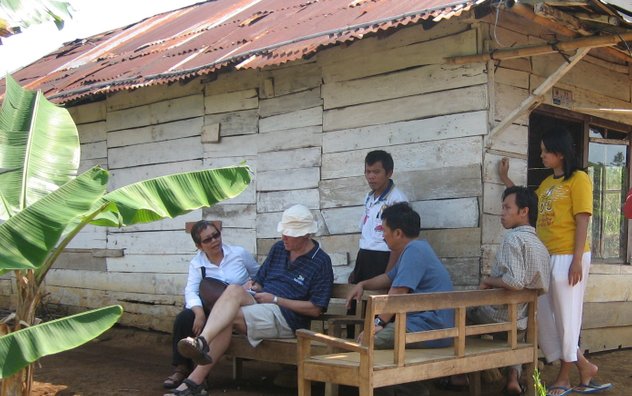Gerry van Klinken
Indonesia democratised in 1998, yet today President Jokowi is seen as regressing to authoritarian developmentalism. Other third wave democracies are in worse shape. The central question this book asks is: Why?
Why were reformist social movements … – and likeminded partners in the North – unable to generate viable alternatives to market-driven globalisation, right-wing populism and technocratic governance? What are the insights in the South and the implications for the North? What can we do?
Not many people connect democratic failure in the South with an equal failure in the North. Political scientists from the rich North have more often just wanted to know what is wrong with these persistently illiberal Asian countries. But the rise of Donald Trump has taken the air out of such Northern smugness.
Olle Törnquist´s approach in In Search of New Social Democracy is fruitful. Thomas Piketty says that in a globalised world it is impossible to build social democracy in one country. The heroes of European social democracy, Olof Palme and Willy Brandt, already argued in the 1970s and 1980s for a New International Economic Order. What happened instead was that Ronald Reagan and Margaret Thatcher created a neoliberal world order that remains with us today. Instead of people, corporations now run the show. What could account for this?
One reason was that progressives in the South, including Indonesia, did not heed the call at the time. They had a brilliant history of anti-colonial activism culminating in the 1950s in a strong movement for inclusive, equal social rights. But in the Cold War of the 1970s they were not willing to politicise democratisation. And so they failed to anticipate the rise of the right-wing state.
A lifetime´s dedicated fieldwork has given this book a historical depth no library study or fly-in-fly-out consultancy could ever have. Törnquist made it a mission to participate personally in the new international order for which his revered Olof Palme struggled and eventually died. From his base at the University of Oslo he collaborated over almost half a century with democracy activists in the Philippines, Indian Kerala, and Indonesia. He talked continually with campaigners from Brazil to South Africa, Thailand to Nigeria, as well as those from his own Scandinavia, who supplied the research funds.
This is his ‘end book’, summing up a life´s work. The message is still directed at progressives in the North: do not turn inwards. Do not try to wrest the initiative from the conservatives with new national deals. Social democracy can only work if it is a worldwide project.
This hands-on approach has peopled the book with unforgettable personalities. Here is Rieke D. Pitaloka, who with Teten Masduki nearly gained the governorship of West Java in 2013:
She looked sharply into my eyes, assuring me that when entering party politics, she benefitted less from her fame as the beautiful flimsy young wife of an auto rickshaw driver in a popular old soap opera, than from her master’s thesis about philosopher Hannah Arendt. Arendt’s argument that bureaucracies may routinize evil reminded me, Rieke said, of how important it was to sustain some of the activism from her student years in order to invigorate parliamentary procedures.
There is Johny Simanjuntak, a barefoot lawyer who worked with peasants who had been kicked off their land by authorities building a big dam in Central Java in the repressive 1980s:
While only 5 feet high in the office, he was tall in the field. Said Johny: the human rights lawyers focused on their propertied clients and only talked of structural legal aid – but when I practiced it, they were nowhere to be found. The students studied Marx and some visited Philippine militants, but when I did that too, and added liberation theology and refused to hit-and-run like a petty guerrilla, they were already in their buses back to Jogja. The locals must survive. One must assist them to gain strength by studying and organising.
These meetings between a European leftist politicised in the spring of 1968, and Asian leftists with their own exemplary heroes from other periods, are the most interesting gems in the book. Mutual recognition alternates with recurring misunderstanding. The book is at once highly analytical and a personal memoir. It is very rare for one person to have such a long and intensive engagement with grassroots democratisation movements as this, in such a variety of third world countries, driven by such a combination of passion and intellectual rigour.
The main aim is to explain why the third wave is stagnating. As in Törnquist´s first major book in English (Dilemmas of Third World Communism, 1984), he emphasises the internal dynamics of grassroots organisations rather than the evils of capitalism. At times he comes across as unduly pessimistic, as if Asian activists have a chronic aversion to aggregating their various causes into one coherent, disciplined, winning alliance. However, the analysis turns towards the end of the book towards a more optimistic notion of ‘reformist populism’.
This is the best book I know to connect post-World War Two democratisation in much of Europe (the second wave) with that of the third wave in Asia.
Olle Törnquist. In Search of New Social Democracy: Insights from the South – Implications for the North. London: Zed, 2022 (available in paperback, hardback, and Kindle).
Olle Törnquist talks about his book in this 22-minute podcast.
Gerry van Klinken (klinken@kitlv.nl) is emeritus professor at the University of Amsterdam, the University of Queensland, and KITLV in Leiden. Gerry is a former editor of Inside Indonesia and now member of its Board.












